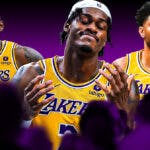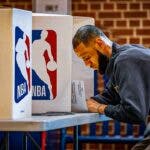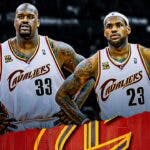The Los Angeles Lakers — the oldest team in the NBA, with championship aspirations — were up 56-30 against the Oklahoma City Thunder — the youngest team in the NBA with lottery expectations — in the second quarter of Wednesday's game at the Paycom Center.
As you surely know by now: the Lakers lost. In fact, they were losing by the time the third-quarter buzzer sounded.
SHAI GILGEOUS-ALEXANDER FROM DEEP TO GIVE OKC ITS FIRST LEAD OF THE NIGHT 🔥 pic.twitter.com/yVYOb1Ye5E
— NBA on ESPN (@ESPNNBA) October 28, 2021
There are many reasons for the loss. The Lakers couldn't make an outside jumper in the second half and were increasingly careless with the rock (especially Russell Westbrook, who finished with a quadruple-double, counting 10 turnovers). Their defense grew lackadaisical towards the end of the first half, enabling a momentum-building run from the upstart Thunder. They were on the second night of a road back-to-back coming off an exhaustive overtime win vs. the San Antonio Spurs. LeBron James was, once again, sidelined with ankle soreness.
Unless (like me, frankly) you're concerned about Westbrook's ability to drop his career-long bad habits (shot selection, turnovers, off-ball defensive lapses, mental mistakes) in crunchtime — which reared their head in this game — then you shouldn't be overly concerned about this avoidable loss. These types of failures will sharpen the Lakers' focus and make them better in the long run.
https://open.spotify.com/episode/55S4gZgF9eD1OYeFlpLc2g?si=d31aa01755ed40f4
However, there is one issue worth spot-lighting, at least in the short term: third quarters.
The Lakers were outscored 41-23 by Oklahoma City out of the locker room. As I pointed out on the ol' Twitter, here's how third quarters had gone for the Lakers this season prior to Wednesday:
- vs. Warriors: outscored 30-26
- vs. Suns: outscored 37-23
- vs. Grizzlies: outscored 34-25
- vs. Spurs: outscored 37-24
In sum, the Lakers have been outscored 179-121 in the third period. Their defense — which was the biggest concern coming into the season and has surrendered 115+ points in five straight games for the first time in franchise history — is averaging 614 points allowed in second halves.
That isn't a schematic or chemistry issue. And, considering the oft-debunked myth about the extent to which coaches make half-time adjustments during the regular season (playoffs are different), it can't be automatically blamed on Frank Vogel.
This is a focus problem, first and foremost. Against Phoenix, the Lakers admittedly lost their heads after some calls didn't go their way. Dwight Howard and Anthony Davis skirmished, Howard was (unofficially) benched for the second half, and the Lakers never found the groove they had coming out of the gates.
“This ain't no adjustment period at all,” said AD, who dropped 30 points. “Not this game. That's just straight on us.”
Against the Grizzlies, Spurs, and Thunder, the energy of three of the league's youngest teams manifested at a momentous speed that the short-handed and elderly Lakers couldn't contain.
Short-handed may be the keyword, after all: the Lakers are playing undrafted rookie Austin Reaves, however instinctually promising he may be, too many minutes. They're relying on way more Rajon Rondo than they intended. Carmelo Anthony will be a net-negative on nights when his shot isn't falling.
Los Angeles will need the likes of Kendrick Nunn, Talen Horton-Tucker, Trevor Ariza, Wayne Ellington, and, of course, LeBron James, to help fend off these types of second-half lapses.
For now, though, the most experienced team in basketball — one that has repeatedly preached its own wisdom — is losing games in the third quarter, and it's a result of mental mistakes, more so than a lack of cohesion.
“A disappointing loss, but a lesson learned,” Frank Vogel said. “An NBA season is a long season and a lesson for our group that you can't ever take your foot off the gas against anyone.”




